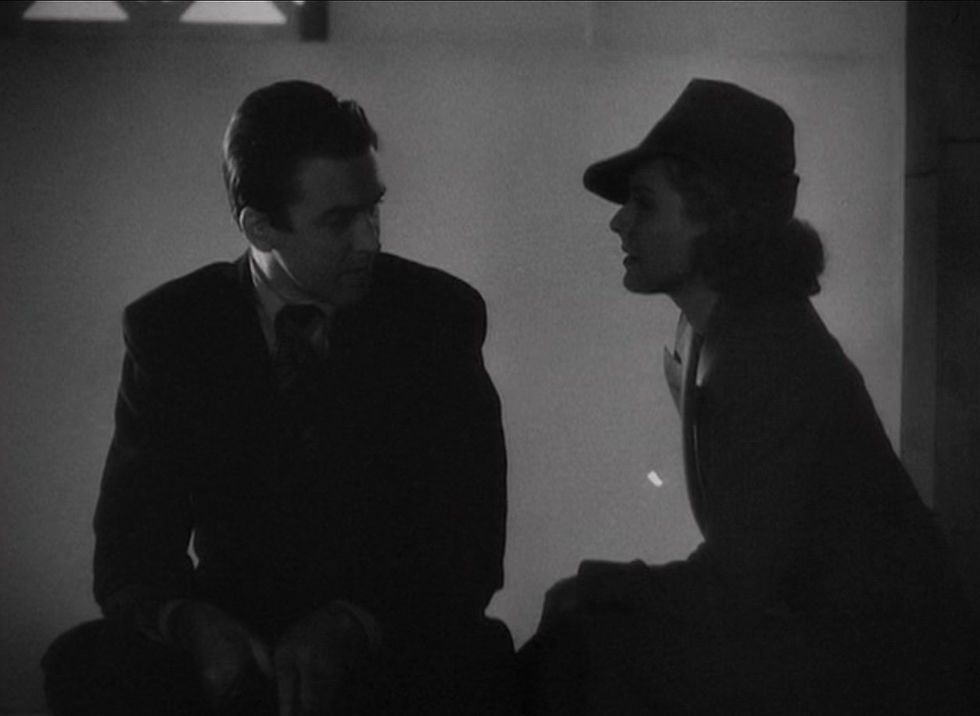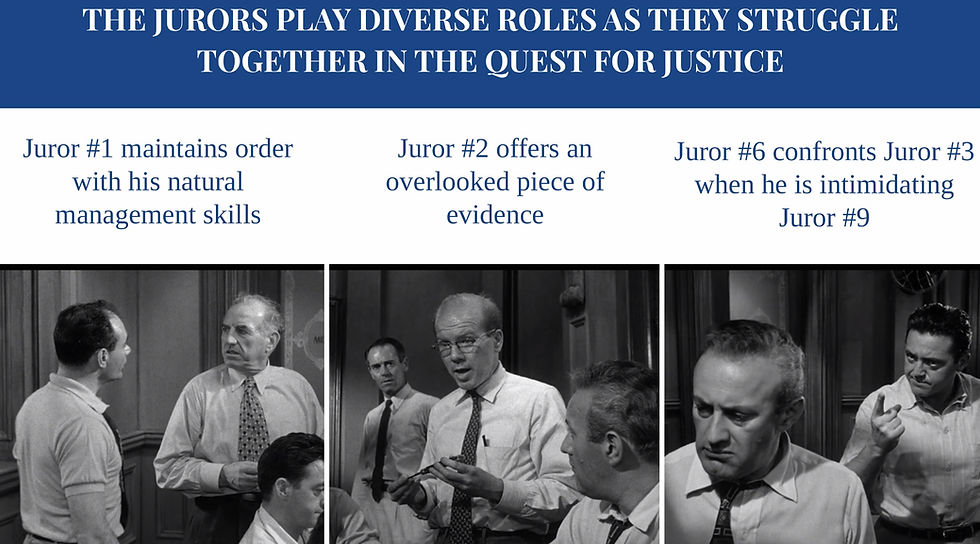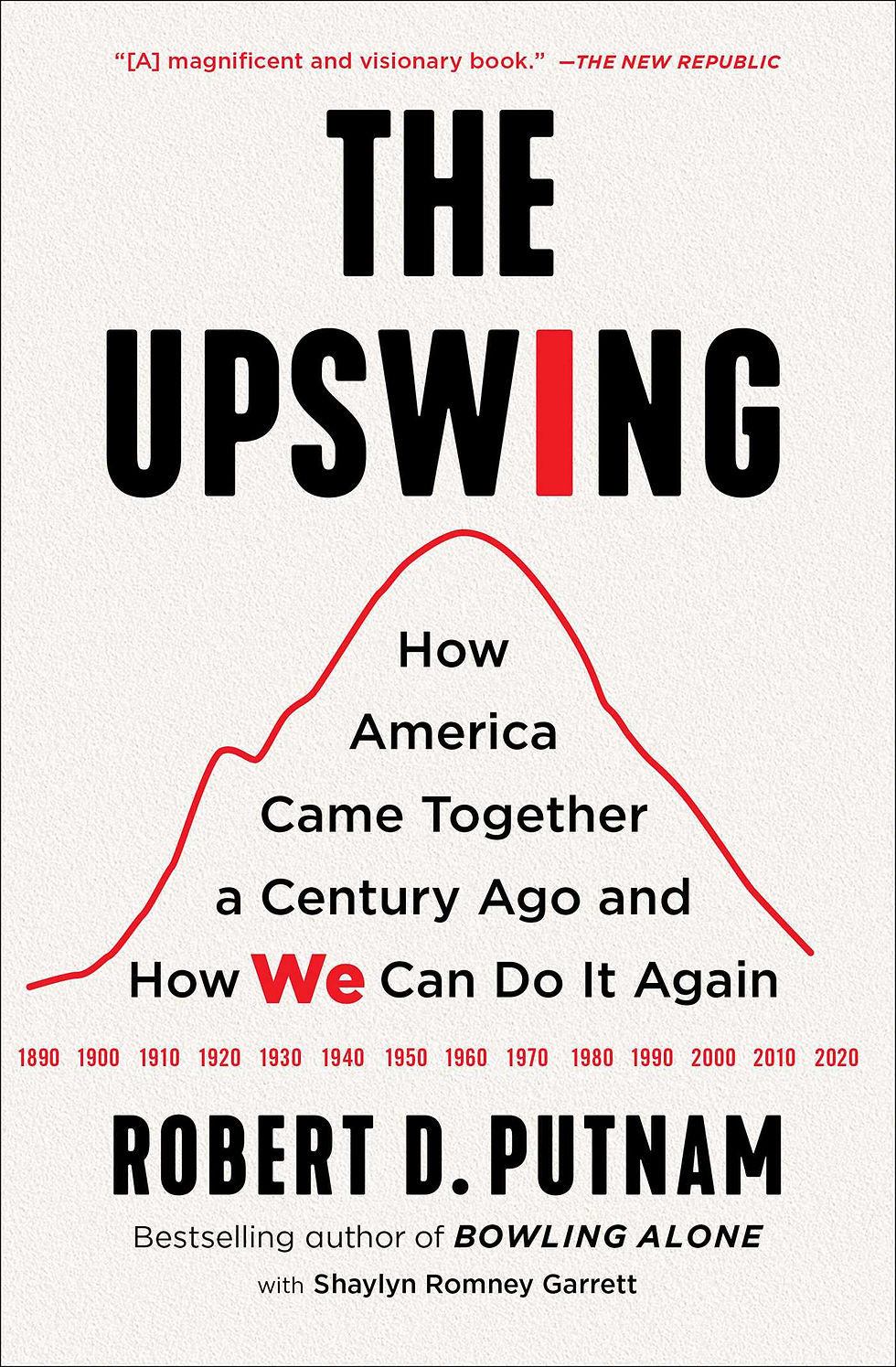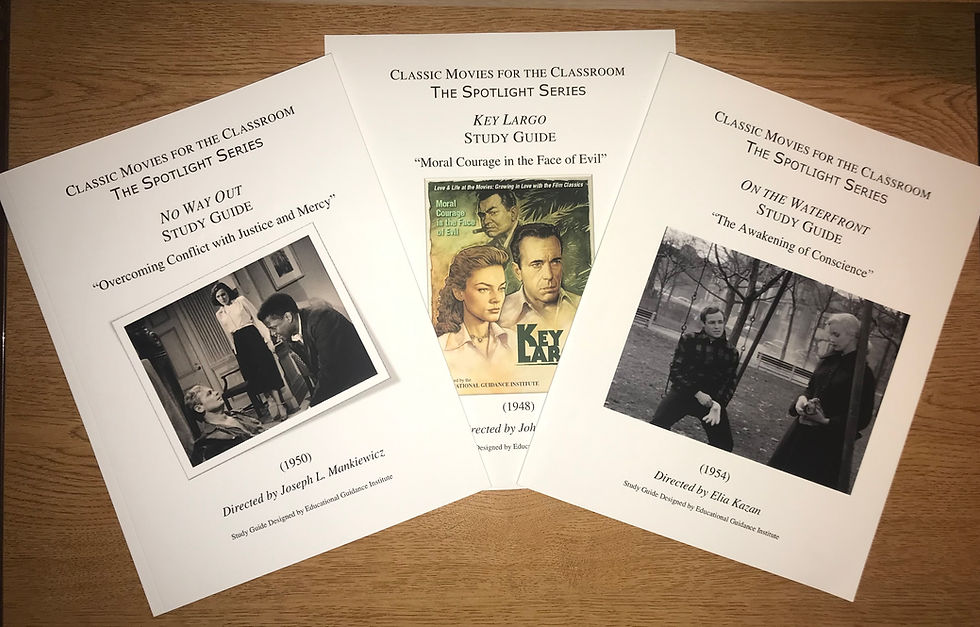From "Me" to "We" in the Art of Classic Film: 15 Movies that Work to Depolarize Our Civil Society
- Onalee McGraw

- Apr 8, 2022
- 14 min read
Updated: Oct 8, 2022
Classic Movie Storytelling
for
Restoring the Ethic of Community in our Civil Society
by Onalee McGraw, Director, Educational Guidance Institute
12 Angry Men, Mr Smith Goes to Washington & Remember the Titans
Reclaiming the moral facts of our human nature to overcome group identity politics
"I don't know if American Democracy can work if we can't share basic facts"
- Jonathan Haidt, social psychologist and author of The Righteous Mind
Public virtue cannot exist in a nation without private virtue, and public virtue is the only foundation of republics"
- John Adams, 2nd President of the United States
These films give to us, as citizens of America across the generations, a treasury of classic movie storytelling to understand more deeply the civic virtues we must reclaim for flourishing in our political community. Here we have our country's own mid-20th century visual art form shining light on the common truths of our human condition. Human learning - both ancient and modern - in psychology, philosophy, aesthetics, political theory, history and culture - is found in the mix with the characters and events of each story. Along the way we encounter political philosophers like Plato, Aristotle, Edmund Burke and Alexis de Tocqueville. Their collective wisdom, applied in classic film study for today's generation of middle, high school and college students, becomes again sources for civic understanding and renewal to rebuild our shattered political community.
ESCAPING FROM PLATO'S CAVE
Encountering FREEDOM, JUSTICE and CIVIC VIRTUE in the sunlight
Mr. Smith Goes to Washington and 12 Angry Men

In Plato’s account the prisoners in the cave experience reality as the shadows projected on the wall of the cave. Only by exiting the cave to experience the sunlight and see the reality of things as they are, can the prisoners be truly free. With classic movies like Mr. Smith Goes to Washington and 12 Angry Men we gaze together upon images of civic life in community and society that need to be grasped if our political community is to flourish once again. We gain shared understanding of the meaning of life for each of us, personally and communally.
Plato said that we must learn to "philosophize with our whole soul" and Mr. Smith Goes to Washington and 12 Angry Men allow us to do that. With these films young people can grasp deeper meaning to be found in the words "liberty and justice for all." Gathering in diverse group settings and classrooms, we can - both young and old - overcome political tribalism and assemble together the scattered puzzle pieces of reality, human experience and history into a coherent whole picture of life's meaning and purpose.

We see the political boss in Jeff Smith's state reflecting the Machiavellian view that politics is merely the jostling of self-interest for political power. What can one citizen do against these powers? Jimmy Stewart's Jeff Smith asks this question of Jean Arthur's Saunders, who urges him to "stand up against the Taylors and the Paines." She tells him that Mr. Lincoln was waiting for him to come along. Yet Jeff cannot act alone. He takes moral action in solidarity with Saunders and others; they are acting persons against tyranny and faction.
12 Angry Men is the definitive film to explore the classic struggle for justice taking place in the setting of a jury room. The gift of authentic justice in political community is only achieved when each individual, as a vital part of the whole, grows in civic virtue through the role given to them. These jurors have a job to do and different roles to be played out in the quest for justice.

To learn about Moral Foundations Theory applied to Mr. Smith Goes to Washington and the 3 Untruths applied to 12 Angry Men, see these Braver Angels film discussions
TAKING A TOUR OF HUMAN NATURE & HISTORY WITH OUR ELEPHANTS and our RIDERS
Jonathan Haidt's Moral Foundations Theory and Remember the Titans

Published in 2012, The Righteous Mind is a breakthrough study in psychology and neurological science explaining to laymen the pathways of the human mind. Author and social psychologist Jonathan Haidt' s goal is to "drain some of the heat, anger and divisiveness" out of the topics of politics and religion, and replace them with "awe, wonder and curiosity." His central metaphor is: Our minds are "divided, like a rider on an elephant....the rider is our conscious reasoning" and the elephant represents our moral intuitions at work. Haidt's findings are not in dispute:
"Moral intuitions arise automatically and almost instantaneously, long before moral reasoning has a chance to get started."
Moral Foundations Theory (as explained in The Righteous Mind) applied to Remember the Titans

Based on real events taking place in Alexandria, Virginia in the early 1970s, this 2000 film was made when these two heroic men, coaches Boone and Yoast, were still with us. Their story was brought to the screen after the screenwriter returned to his home town and discovered the history of the Titans football team overcoming racial divisions and tribalism. From the earliest pilots in our classic film project, Remember the Titans was an important part of our treasury of films, even though it appeared on the screens of America years after the "golden age" in Hollywood had ended. Like two other films in our project, Mr. Smith Goes to Washington and No Way Out, this film carries great educational importance for the times we are living through. Lesson plans integrating Moral Foundations Theory (as explained in The Righteous Mind) into these films unfold this truth: we have innate moral intuitions that we share with others by virtue of being human.
Here available for download are lesson plans utilizing Moral Foundations Theory: https://educationalguidanceinstitute.com/liberty-and-justice-for-all-post-viewing-handout/

At the beginning of the film, Coach Boone, played by Denzel Washington, dramatically drives home the witness of self-sacrifice by the young soldiers buried on the hollowed grounds of Gettysburg where the team is practicing in camp.
Watching this sequence in Remember the Titans mysteriously triggers one of the six pillars of moral intuition in Moral Foundations Theory - our sense of Sanctity.
Coach Boone tells his players: "...take a lesson from the dead. If we don't come together...right now on this hallowed ground...then we too, will be destroyed, just like they were. I don't care if you like each other or not, but you will respect each other, and maybe...learn to play this game like men."
Somehow the postmodern reduction of our human nature down to mere "bodies and brains" does not make sense here. The human imagination is stronger than the philosophical claims of materialism and relativism . Jonathan Haidt explains why every American's moral matrix must expand beyond merely the Care and Fairness foundations. Moral intuitions of Care and Fairness must blend with Liberty, Loyalty, Authority, and Sanctity in the mix of teaching and learning for a nation and its people to thrive. As Haidt puts it:
"If your moral matrix rests entirely on the Care and Fairness foundations, then it's hard to hear the sacred overtones in America's unofficial motto: E pluribus unum (from many, one). By "sacred" I mean the concept I introduced with the sanctity foundation in the last chapter...It's the ability to endow ideas, objects, and events with infinite value, particularly those ideas, objects, and events that bind a group together into a single entity. The process of converting pluruus (diverse people) into unum (a nation) is a miracle that occurs in every successful nation on Earth. Nations decline or divide when they stop performing this miracle."

For readers who may be inspired to develop a semester civic education course for high schoolers or college students utilizing classic films, we recommend the scholarship of Robert Putnam's The Upswing. Putnam draws on a huge body of social science data documenting a rising, and then around the peak year of 1960, a declining era of American moral consensus. Events in Alexandria, Virginia portrayed in Remember the Titans were unfolding about a decade past the tip of the era when America was coming to a greater national consensus on human rights.
Giving us deeper insight into this historic period, in America Against Itself (1992), Father Richard John Neuhaus - who was in the early era of the civil rights movement with Martin Luther King as pastor of St. John's church in Brooklyn - explains how King's vision endures. He comments:
"That period remains the moral baseline for our thinking about civil rights...Dr. King made the case for civil rights and for human rights in a way that was democratically legitimated. He made the case from an account of the good that was manifestly derived from a religious claim of transcendent truth. He contended for the enforcement of the unenforceable. Popular thought about civil rights today is still living off the moral capital accumulated by the work of Dr. King."

No Way Out, Key Largo, & On the Waterfront
Acting Persons in a Shared Moral Universe
"Feelings and ideas are renewed, the heart enlarged, and the understanding developed only by the reciprocated actions of men, one upon the another."
-Alexis de Tocqueville, Democracy in America

These three films draw us more deeply into the classical understanding of our human condition; the view of our shared humanity defended by political philosopher Edmund Burke against the flawed and imbalanced accounts from Enlightenment theorists such as Kant and Rousseau. In Edmund Burke, A Genius Reconsidered, Russell Kirk explains how Burke stood up against the tragic errors about human nature proclaimed by Rousseau and the French philosophes.
Like Aristotle and Cicero in the ancient world, Edmund Burke is a political philosopher for all seasons. At the onset of the French Revolution, Burke stood virtually alone while the great majority of the British educated elites of that era mistakenly thought it was a triumph of Enlightenment scientific rationalism over ''ancient religious superstitions." Burke had a classical understanding of human nature to know cataclysmic consequences were to follow. Kirk quotes President Woodrow Wilson who, over a century later admitted: "Burke was right... when he thought to keep the French infection out of England."
Edmund Burke's concept of the "Wardrobe of the Moral Imagination"

Edmund Burke understood that pure reason can never take the place of rightly ordered affections. He uses the phrase "wardrobe of the moral imagination" to explain the truth that human beings have the capacity to see the ideas "that the heart owns and the 'understanding ratifies.'" In A Vindication of Politics: On the Common Good and Human Flourishing, Matthew D. Wright comments on Burke's insight that moral sentiments must be habituated and passed on across the generations. Wright comments that, "the great folly of the French revolutionaries was to suppose that they could attain the goods of society on the basis of human nature, when such goods are, in fact, the product of a long- habituated second nature. Social institutions are not pulled out of thin air." In tandem with this, C. S. Lewis wrote The Chronicles of Narnia to teach through storytelling what he feared his fellow countrymen did not see so clearly from his masterful work The Abolition of Man.
Classic films help to furnish the wardrobe of the moral imagination for the present generation born into the internet era. Three celebrated directors, Joseph L. Mankiewicz with No Way Out, John Huston with Key Largo and Elia Kazan with On the Waterfront give clear evidence that: we are hardwired as social beings who bear moral responsibility for each other by virtue of our common humanity.
No Way Out 1950, directed by Joseph L. Mankiewicz

Education reformer Jacques Barzun, in Begin Here: The Forgotten Conditions of Teaching and Learning, reminds us of our social and cultural need to converse with each other in a common language on things of deep and lasting importance; concepts of the meaning of Freedom and Justice, and governing ourselves in a free society. Barzun reminds us: "The need for a body of common knowledge and common references does not disappear when a society is pluralistic. On the contrary, it grows more necessary, so that people of different origins and occupation may quickly find familiar ground and as we say, speak a common language." Consider how the dialogue in the final scene of No Way Out gives us common language to introduce and discuss topics in the classroom such as racial hatred and universal human dignity most often mired in political controversy. Persecuted throughout the film by a psychopathic racist, Sidney Poitier, in his film debut, plays Doctor Luther Brooks who makes the moral choice to save this man's life. He even persuades the woman the racist has deeply wronged to help him in this life- saving task. He says to her:
"I can't kill a man because he hates me."
We have piloted No Way Out over the years with high school and college students in various learning settings including an opportunity to screen the film during Black History Month at Westfield High School in Northern Virginia in Project Heart to Heart. See this blog post below for more information on our successful pilots!
Key Largo, 1948, directed by John Huston

The fourth film Humphrey Bogart and Lauren Bacall made together, Key Largo is the post World War II melodrama that once again has Humphrey Bogart as the conflicted hero who ultimately chooses the higher road. He is a war veteran drowned in bitterness who proclaims he has no civic duty to defend the good and oppose evil gangster, Johnny Rocco (played by the legendary Edward G. Robinson). Yet, when he sees Rocco humiliating and tormenting his discarded mistress, Bogart's character gains moral courage to act - even at the risk of his life.

On the Waterfront, 1954 directed by Elia Kazan:
We are bonded together in a moral universe whether we like it or not

In American Awakening: Identity Politics and Other Afflictions of Our Time, Joshua Mitchell, professor of political theory at Georgetown University, analyzes our national disorders as akin to those of a "deeply dysfunctional family. ''
Mitchell comments:
"Having few occasions actually to work together on matters of common concern, citizens say what is expected of them, then return to their private worlds, relieved that the awkward encounter is now behind them. Today, far too many citizen-subjects have passively settled in, strangely satisfied with the caricatured categories contrived on their behalf, not because they know them to be true, but because the cost of undoing them is too high."
Screening and discussing films like On the Waterfront with young people today can help us behold together what living life in a shared moral order looks and feels like. There is a back story of the role of director Elia Kazan in the tragic era of the Hollywood blacklist that shows how politics, culture, ethics and ordinary life intersect. Whatever our individual failings may be, we are called to be morally responsible for each other in a free society. Marlon Brando's Terry Mulloy struggles to act rightly, deeply impacted by three persons: the woman he loves, Eva Marie Saint; the priest who challenges him to act, Karl Malden; and his brother, brilliantly played by Rod Steiger, who makes the decision to give his life for Terry's sake.

These three study guides in EGI's Spotlight Series are available on Amazon
Six Western Classics Model the Struggle for Civic Friendship & Care for the Common Good
High Noon (1952) Shane (1953), Bad Day at Black Rock (1955), 3:10 to Yuma (1957), The Big Country (1958), and The Man Who Shot Liberty Valence (1962)
Moral choices for sustaining political community:
High Noon, 3:10 to Yuma and The Man Who Shot Liberty Valence
We explore the vexing questions of moral meaning and the nature of civic friendship in these stories of crisis in fragile Western political communities. Classic movie storytelling allows us to gaze into transcendent space where left-brained philosophical discourse often falters. In the groves of the academy, the professional political philosophers will usually disagree. So what can this generation that never has known the flourishing of the ethic of community in the public square find here? In High Noon, Marshall Will Kane discovers that he has no friends to join him in the life and death struggle for preserving civic order in their town. In 3:10 to Yuma the town drunk becomes a courageous hero, dedicated to the preservation of his community's moral order. In The Man Who Shot Liberty Valence there is a passage of time and opportunity for reflection. John Wayne's character, Tom Doniphon, makes the sacrifice for the preservation of the fragile political community of Shinbone, depicting the intersection of the deeply personal and the political good.

Gary Cooper's Marshall Will Kane stands alone in this famous scene from High Noon. One by one, his fellow citizens have left him alone in his determination to do his civic duty, even at the risk of his life.

High Noon has a backstory that gives historic insight into the crisis of the Hollywood blacklist revolving around its screenwriter Carl Foreman, and documented in Glen Frankel's High Noon: The Hollywood Blacklist and the Making of and American Classic.
Foreman's script reflects his own experience during the second visit to Hollywood by the House Un-American Activities Committee (HUAC). Some of Foreman's friends on the left let him down, while others on the right, notably Gary Cooper, gave him needed support. This is another account of just how fragile civil communities will always be, given the limitations of our human nature. All too easily we rationalize our moral failures when it is really self -interest that is operating. The nature of politics and the need for deep awareness of the limitations of our human nature was understood by our nation's Founders, notably in No. 51 of The Federalist Papers: James Madison said, "what is government itself, but the greatest of all reflections of human nature?"
Case studies on defending the common good in civil society:
Bad Day at Black Rock, Shane, & The Big Country
In Bad Day at Black Rock, we see imperfect people struggling to take moral action. Some characters are passive participants who seem to lack any conscience, while others are falsely convinced that they can remain neutral observers of the evil that is taking place. In the final scene, the town is given a new chance for moral renewal because enough people have stood up against the evil. In a crucial scene in Shane, the two leads (Alan Ladd and Van Heflin), make the case to their fellow settlers that they ought to overcome fatalism and choose to fight for the right to live together in community. The Big Country is a case study in citizens making moral choices to be in solidarity with one another. If too many citizens act as "me first" autonomous selves the political community cannot be sustained.
The Films of Jimmy Stewart: The Power of Transcendence
Carbine Williams, Call Northside 777 & It's A Wonderful Life
"To love rightly is to love what is orderly and beautiful in an educated and disciplined way...for the object of education is to teach us to love what is beautiful."
-Socrates

How do we escape from the swamp of group identity politics and cultivate the ethic of community on the dry land of Aristotle's Nicomachean Ethics? It is a painstaking reclamation project in civics with no easy solutions. The first step is to recognize that we cannot solve life's problems alone. Christopher Peterson and Martin Seligman, positive psychology pioneers, give us a comprehensive list of the virtues and character strengths "that constitute the well lived life." Peterson and Seligman describe the character strength of transcendence as "the belief that there is meaning or purpose larger than ourselves. Transcendence, in other words, is the opposite of nihilism, the contention that life has no meaning...transcendence that can be something or someone earthly that inspires awe, hope, or even gratitude - anything that makes our everyday concerns seem trifling and the self seem small."
Carbine Williams, 1952 directed by Richard Thorpe
This Jimmy Stewart biopic of Marshall "Carbine" Williams was based on the Reader's Digest article, The Most Unforgettable Character I've Met by Capt. H. T. Peoples. Williams was sentenced to thirty years hard labor, charged for killing a federal agent during the Prohibition Era. While he was in prison, Williams invents a new rifle that is significantly lighter in weight. Eventually, with the help of his good friend, Warden Peoples, Williams is pardoned and goes on to perfect the rifle that was carried by our troops in World War II. As the film shows, Williams had highly complex relationships with his father, wife, and son. Initially trapped in a fatalist mode, Williams' friendship with Warden Peoples makes all the difference. In EGI's study guide, The Films of Jimmy Stewart, a lesson plan is featured on Carbine Williams and Three Philosophies of Life. This was the only film in which Jimmy Stewart played a character who actually adopted all three philosophies in his lifetime. He begins in expressive individualism, falls into fatalism, and finally walks the Aristotelian road of classic realism.
Call Northside 777, 1948 directed by Henry Hathaway

In many of his films, Jimmy Stewart would seem to play again the ordinary guy fighting for truth and justice just as he did as Jeff Smith in Mr. Smith Goes to Washington. His character of an investigative reporter in Call Northside 777 differs to some degree from Jeff Smith in that he is initially cynical. It takes a great deal of integrity on the part of a brave mother and her innocent son to break through his skepticism. This film documents the true story of a grave miscarriage of justice from the Prohibition Era in Chicago and also dramatizes the code of ethics and dedication to the truth that commonly shaped
newspaper journalism in the day.

In Bad News: How Woke Media is Undermining Democracy, Batya Ungar-Sargon comments on the realities of modern journalism saying, "once a tool to comfort the afflicted and afflict the comfortable, today American journalism comforts the comfortable...and insists on and orthodoxy that protects the interests of the elites in the language of a culture war whose burden is given to the working class to bear."
It's A Wonderful Life, 1946 directed by Frank Capra

Community is a vital part of life that is universally cherished because in our human nature we are social beings. Our civil life is already dangerously fractured by social media, especially for our young people. The first steps are to rediscover and to shine light on our common humanity. To quote G. K. Chesterton, "we are all in the same boat... and...owe each other a terrible loyalty." It is interesting to note that one of our most popular presidents, Harry S. Truman, was in office when all three of these Jimmy Stewart films were made. It's A Wonderful Life, along with the 13 other films highlighted here, give us a "big picture" view of what makes a community strong, real, and vibrant - even in a time when so many of us have not experienced genuine community life.

See you at the movies!
For more information, visit https://www.amazon.com/Dr-Onalee-McGraw/e/B08BX7KKBC?ref=sr_ntt_srch_lnk_1&qid=1648070181&sr=8-1
































Comments